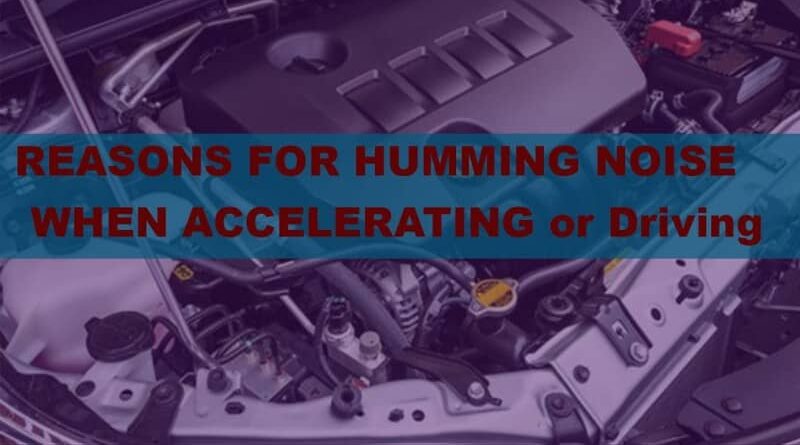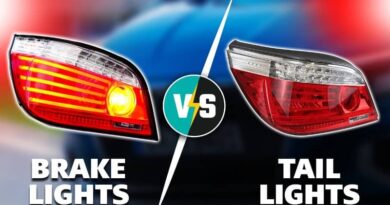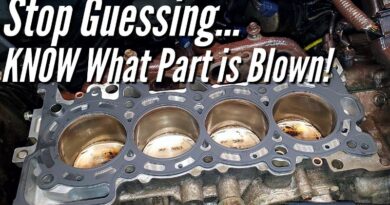
Have you ever noticed a strange humming noise from your car during acceleration? It can be concerning, especially if you don’t know the cause. This mysterious humming noise has puzzled many car owners about its origin.
The starting point to resolve this matter is identifying where the noise originates.
If you hear a humming noise when you accelerate your car, diagnosing what’s causing the sound is essential. Several issues may cause this type of noise, such as worn wheel bearings or faulty transmission.
In this article, we will explore the secrets behind this phenomenon, the possible causes, and ways to address the humming noise when accelerating.
Car Makes Humming Noise When Accelerating
Engine Issues
One possible cause of the humming noise could be engine-related problems. These issues might include a damaged or worn-out serpentine belt, faulty pulleys, or issues with the alternator.
Any malfunction in these components can lead to abnormal noises, including a humming sound.
Wheel Bearings
Worn-out or damaged wheel bearings are another common culprit behind the humming noise. Wheel bearings allow the wheels to rotate smoothly, and when they become worn or damaged, they can produce a humming sound, especially during acceleration.
Tires and Tire Alignment
Uneven tire wear or misaligned tires can also contribute to the humming noise. If the tires are not correctly balanced or aligned, they can create vibrations and humming as the vehicle accelerates.
Exhaust System Problems
A malfunctioning exhaust system can cause a humming noise during acceleration. Issues such as a damaged muffler or a leak in the exhaust system can alter the airflow, resulting in unusual sounds.
Transmission Humming Noise When Accelerating
Problems with the transmission can lead to a humming noise as well. If the transmission fluid is low or needs to be changed, it can affect the smooth functioning of the transmission, causing noise during acceleration.
Braking System Defects
Faulty braking system components, such as worn-out brake pads or rotors, can generate a humming noise. This noise may become more apparent when you accelerate, indicating the need for brake system maintenance or repairs.
How to Diagnose the Source of the Humming Noise?
When diagnosing the source of a humming noise when accelerating, there are several steps you can take to narrow down the potential causes.
Checking this video will land you in the right direction.
In this video, you will come to know that acceleration-induced humming can produce various sounds, such as a high-pitch shriek or a low-pitch whir. It typically originates from the engine or the components associated with the vehicle’s motion.
Buzzing sound when accelerating
When driving and trying to identify a buzzing sound, paying particular attention to an audio file could be helpful. Determine whether the grinding sound comes from the engine, the wheels, or other car parts.
Visually Inspecting Components
Performing a visual inspection of various components can provide valuable insights. Look for signs of damage or wear on the serpentine belt, wheel bearings, tires, exhaust system, and braking system. Any visible issues may indicate the cause of the humming noise.
Seeking Professional Help
It’s best to seek the advice of a qualified mechanic if you’re struggling to locate the cause of the humming sounds. They possess the knowledge and diagnostic equipment to identify the issue and suggest the best solution.
Addressing the Issue
Once you have identified the source of the humming noise, it’s crucial to address the underlying issue promptly. Here are some potential solutions based on the different causes mentioned earlier:
Engine Maintenance and Repair
It’s best to have your vehicle checked by a skilled mechanic if any signs of engine-related problems manifest as humming noise. The service includes examining all malfunctioning parts, like the alternator, and fixing them if possible.
Wheel Bearing Replacement
Worn-out or damaged wheel bearings may require replacement. A professional mechanic can assess the condition of the wheel bearings and replace them if necessary to eliminate the humming noise.
Tire Maintenance and Alignment
It’s essential to have them properly balanced and aligned for uneven tyre wear or misaligned tyres. This can be done by a tyre professional who will ensure that the tyres are in optimal condition, reducing the humming noise.
Exhaust System Repairs
If the humming noise originates from the exhaust system, a mechanic can inspect it for damage or leaks. Repairs or replacement of damaged components can restore the proper airflow and eliminate the noise.
Transmission Service
A transmission service may be required for humming noises caused by transmission issues. A professional can check the transmission fluid levels and condition, perform necessary fluid changes or repairs, ensure smooth operation and minimise noise.
Conclusion
The mysterious humming noise when accelerating can be unsettling, but with the proper knowledge, you can unravel its secrets. By understanding the potential causes and following appropriate diagnostic and maintenance procedures, you can address the issue and enjoy a smooth, noise-free driving experience.
F.A.Q.s
1. Can the humming noise during acceleration cause damage to my vehicle?
No, the humming noise itself may not directly damage your vehicle. However, addressing the underlying cause promptly is essential to prevent potential damage or further complications.
2. Why does the humming noise in the car get louder with the speed?
The humming noise may become more audible as you accelerate because the components responsible for the noise, such as the engine or wheel bearings, are subjected to increased stress and speed.
3. If the humming isn’t too loud, can I ignore it?
Even though you might be inclined to disregard a slight humming sound, it’s best to have it examined by a specialist. If ignored, little problems can grow over time into bigger ones that require more attention.
4. How often should I have my vehicle inspected to prevent humming noise issues?
Regular maintenance checks, including inspections of belts, bearings, tires, and the exhaust system, are recommended as part of routine vehicle care. Consult your vehicle’s owner manual for specific maintenance intervals.


